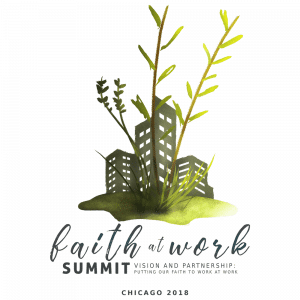Eschatology has been a sore spot for the faith-and-work movement.
We can’t avoid it, because our daily lives aren’t centered on the gospel if our daily work doesn’t point people forward toward the glorious future of Christ’s return. We need to know what the end of our work is.
In C. S. Lewis’s allegorical novel The Pilgrim’s Regress, Mr. Savage sneers at the inhabitants of Claptrap (who represent respectable, bourgeois Enlightenment society) because they spend their whole lives working and building, even though they all die in the end, thereby losing everything they worked to build.
“They might be building for posterity,” Mr. Virtue objects.
 “And whom will posterity build for?” Mr. Savage snorts. “Can’t they see that it all comes to nothing?”
“And whom will posterity build for?” Mr. Savage snorts. “Can’t they see that it all comes to nothing?”
Some in the faith-and-work movement tend to stress eschatological continuity—the idea that Jesus’s return brings to fruition the redemptive work he’s already doing. Others emphasize eschatological discontinuity, the idea that Jesus’s return brings the old era to a close in a catastrophe of destructive judgment and radical new beginnings.
Continuity and discontinuity are both needed for a sound eschatology, and hence for a sound approach to our daily work. Continuity alone brings us vocational captivity to worldly standards and moralistic legalism. Discontinuity alone brings us vocational detachment and even resentful isolation.
Until the Holy Spirit so sanctifies the church that we all get the balance exactly right, our best hope is to listen to and learn from those whose tendency is to lean in the opposite direction from our own preferences. I recognize in myself the tendency to stress discontinuity, so it is incumbent on me to take special care to listen to those who emphasize continuity.
Called and Comforted
Eschatological continuity emphasizes excellence in our work, setting the standard for which we strive. The work of the new era, which is to continue into eternity, must begin now. Otherwise we do not really live in God’s kingdom, which Jesus said was arriving when he first came. We need an operational new-era end and ethic that we can put into practice, or else our work will be dominated by the old-era ends and ethics all around us.
At the same time, eschatological discontinuity emphasizes comfort and hope when our work is painful and frustrating. Until Jesus comes back and brings the old era to an end, the new-era mission is limited in scope. We know that our faith is a source of profound comfort for our daily suffering and frustration. It is so only because it holds out the promise of a better world, where suffering and frustration are destroyed forever.
Polemical and Patient
Eschatological continuity emphasizes fighting for justice, bearing prophetic witness against the darkness of the world, and exercising kingly and queenly authority in dispelling it from our own domains of responsibility.
In our daily work, we are engaged on the front lines of a holy war to reclaim our spheres of responsibility from sin and Satan. That’s why the first item on our to-do list at work every day is, as Dallas Willard said, a “gentle but firm noncooperation with things that everyone knows to be wrong.” No matter how gentle we are, we must be firm, and that means tension and conflict.
The line between good and evil, however, is not always one that “everyone knows.” We do not always agree about what is acceptable. Sometimes the right thing to do simply isn’t clear. And sometimes it is clear, yet sin has gained such widespread cultural acceptance that the minds of those around us are darkened even to obvious moral imperatives.
In our daily work, we are engaged on the front lines of a holy war to reclaim our spheres of responsibility.
Eschatological discontinuity can help us here, emphasizing moderating our ambitions to see justice and mercy vindicated, and waiting patiently for the Lord’s judgment upon the overwhelming majority of evil that we are not authorized or able to remove ourselves.
There are two dangers here. One is to become complacent about fighting for justice, allowing evil to remain unmolested in the domains over which we have jurisdiction and left unchallenged elsewhere. The other is to forget the limits of our authority and ability to remove evil while the world remains fallen, and in so doing overstep our bounds and hurt other people in our zeal.
Eschatological continuity helps us keep pressing into the edge of the war against sin every day. Eschatological discontinuity helps us wait patiently as evil seems to triumph for a season.
Assembled and Accommodating
The faith-and-work movement emphasizes that Scripture calls us to serve the common good between the church and the world—good things that serve not only the church, but everybody. In that way, we can participate in what God is doing in the world.
But can we even have a “common good” without a common god? Yes and no. The world’s failure to acknowledge God does not change what is actually good for human beings—the things God has ordained as good for us. However, if we expect everyone in a fallen world to agree about what is good, and demand such agreement as our right, endless culture war is the result.
But can we even have a ‘common good’ without a common god?
When we remember that Jesus’s return will renew the earth and consummate God’s ongoing good work, we will seek to build moral consensus with our neighbors, in order to carry on God’s work now. Eschatological continuity emphasizes joining with others to serve the common good of the community, going beyond the walls of the church to form civic community with those who believe differently in the service of common causes.
And when we remember that Jesus’s return will bring a catastrophic confrontation and judgment upon a sinful world, we will accept differences with grace. We will strive to cope with pluralism through compromise, without demanding a social unity only Jesus’s return can bring. Eschatological discontinuity emphasizes accepting differences and compromises, coping in a spirit of patience and grace with the world’s rejection of the church’s message and work.
Like many aspects of theology, eschatology is more both/and than either/or. With the Holy Spirit’s help, we can balance our perspective on work to be both called and comforted, polemic and patient, assembled and accommodating.
Editors’ note: This article was adapted from a series of posts at The Green Room.
Involved in Women’s Ministry? Add This to Your Discipleship Tool Kit.
 We need one another. Yet we don’t always know how to develop deep relationships to help us grow in the Christian life. Younger believers benefit from the guidance and wisdom of more mature saints as their faith deepens. But too often, potential mentors lack clarity and training on how to engage in discipling those they can influence.
We need one another. Yet we don’t always know how to develop deep relationships to help us grow in the Christian life. Younger believers benefit from the guidance and wisdom of more mature saints as their faith deepens. But too often, potential mentors lack clarity and training on how to engage in discipling those they can influence.
Whether you’re longing to find a spiritual mentor or hoping to serve as a guide for someone else, we have a FREE resource to encourage and equip you. In Growing Together: Taking Mentoring Beyond Small Talk and Prayer Requests, Melissa Kruger, TGC’s vice president of discipleship programming, offers encouraging lessons to guide conversations that promote spiritual growth in both the mentee and mentor.

































